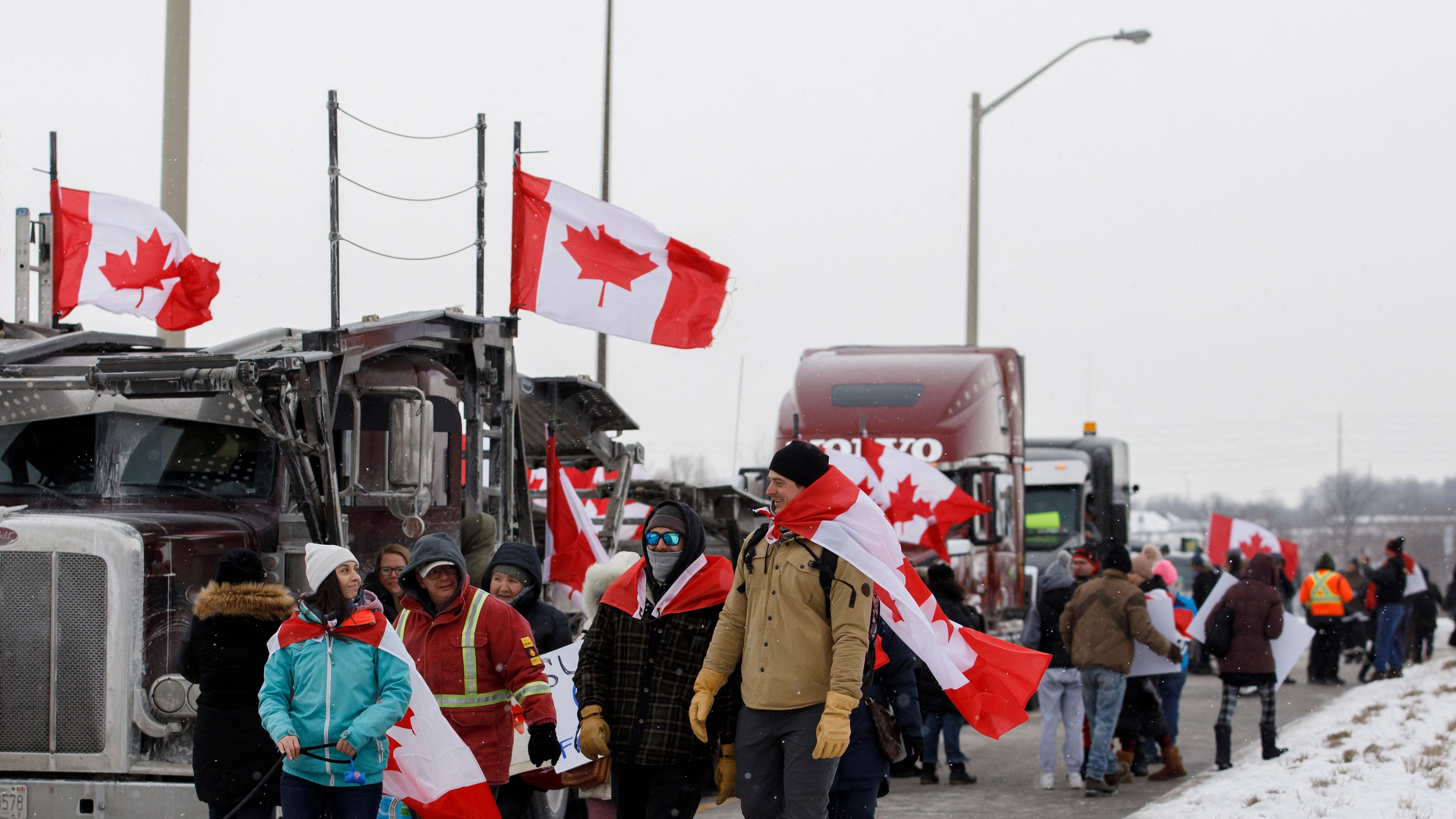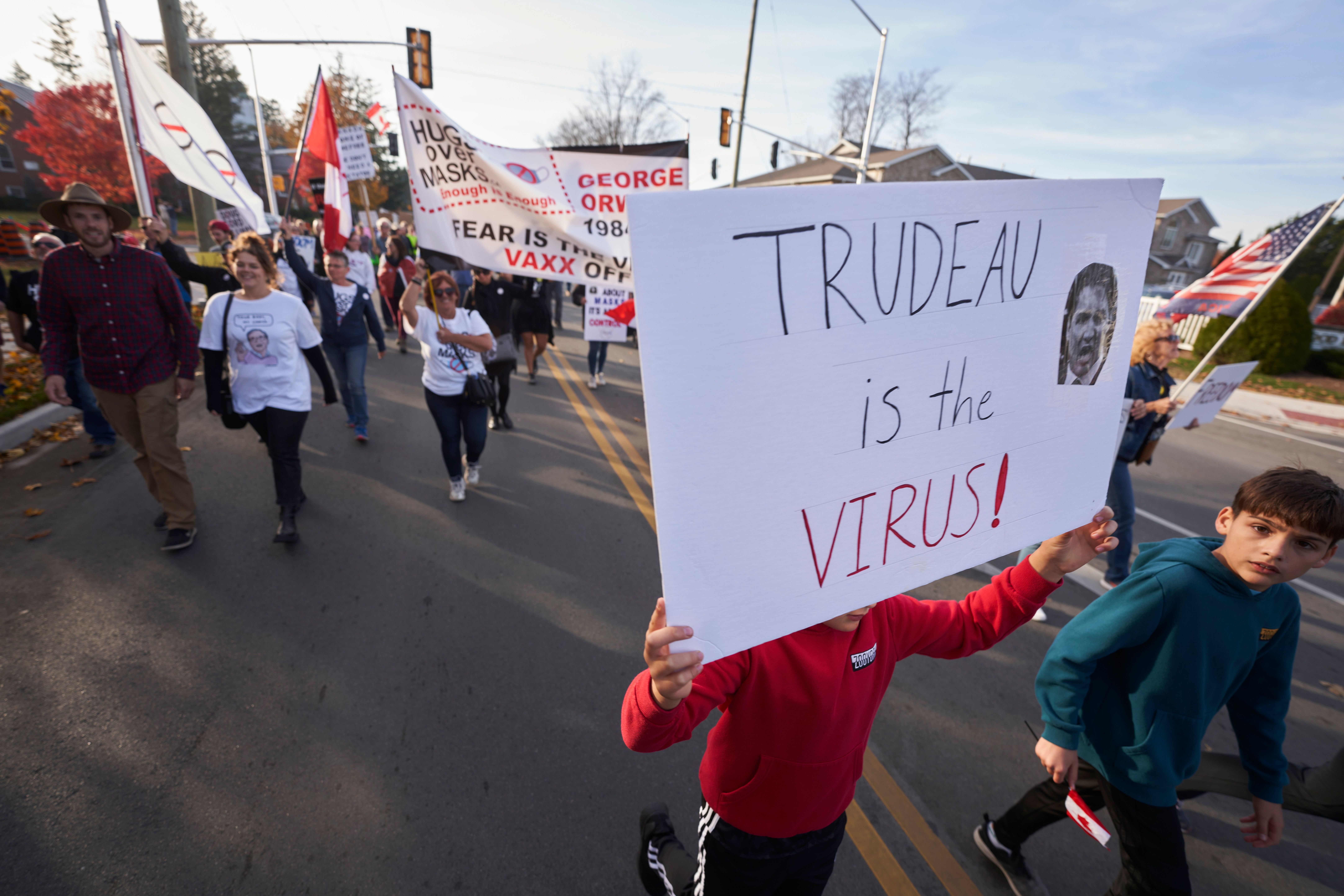‘State of emergency’: everything you need to know about the Canada trucker protests
Ottawa police chief describes ‘siege’ mentality as thousands join Covid restriction protests

A free daily email with the biggest news stories of the day – and the best features from TheWeek.com
You are now subscribed
Your newsletter sign-up was successful
The mayor of Canada’s capital city has declared a state of emergency following a week of protests against Covid-19 restrictions that have paralysed the city’s downtown.
Led by a group of truckers known as the “Freedom Convoy”, demonstrators originally gathered near Ottawa’s Parliament Hill demanding the scrapping of a “rule that all truckers must be vaccinated to cross the US-Canada border”, the BBC reported.
But “the protests have now morphed into broader challenges to Covid health restrictions”, with activists also demanding an end to “all such mandates nationwide and opposing the government of Prime Minister Justin Trudeau”.
The Week
Escape your echo chamber. Get the facts behind the news, plus analysis from multiple perspectives.

Sign up for The Week's Free Newsletters
From our morning news briefing to a weekly Good News Newsletter, get the best of The Week delivered directly to your inbox.
From our morning news briefing to a weekly Good News Newsletter, get the best of The Week delivered directly to your inbox.
‘We have to get our city back’
Speaking to Canadian radio station CFRA, Mayor Jim Watson said that Ottawa was now “completely out of control”, stating that protesters outnumber police and that the demonstrations pose a threat to public safety.
The mayor warned that the demonstrators were behaving “insensitively”, describing how they were continuously “blaring horns and sirens, [setting off] fireworks and turning it into a party”. He also said that there have been reports of racial attacks.
“Clearly, we are outnumbered and we are losing this battle,” he said. “This has to be reversed. We have to get our city back.”
The declaration of a state of emergency “highlights the need for support from other jurisdictions and levels of government”, The Guardian reported.
A free daily email with the biggest news stories of the day – and the best features from TheWeek.com
It also “gives the city some additional powers around procurement and how it delivers services”, a move that “could help purchase equipment required by frontline workers and first responders”.
The “Freedom Convoy” began as “a movement against a Canadian vaccine requirement for cross-border truckers”, Sky News said. But it has since attracted support from a range of US politicians, including former president Donald Trump.

Bruce Heyman, a former US ambassador under Barack Obama, hit out at US politicians lending their support to the movement, tweeting: “Canada-US relations used to be mainly about solving technical issues. Today Canada is unfortunately experiencing radical US politicians involving themselves in Canadian domestic issues.
“Trump and his followers are a threat not just to the US but to all democracies”, he warned, adding that “under no circumstances should any group in the USA fund disruptive activities in Canada. Period. Full stop.”
His warning about foreign funding came after “GoFundMe closed a fundraising page set up by groups in the US to help support the truckers’ rallies”, Sky News reported.
Some US politicians have been open about their support for the movement, with Texas attorney general Ken Paxton tweeting: “Patriotic Texans donated to Canadian truckers’ worthy cause.” Texas senator Ted Cruz told Fox News that the “government doesn’t have the right to force you to comply with their arbitrary mandates”.
Their interventions caused Gerald Butts, a former senior adviser to Trudeau, to tweet: “For some senior American politicians, patriotism means renting a mob to put a G7 capital under siege.”
An opinion poll of 1,410 people by Abacus Data found that 68% of Canadians felt they had “very little in common” with the anti-vaccination protesters, while 32% said they “had a lot in common” with the truckers.
Nationwide mobilisation
Ottawa police chief Peter Sloly has told reporters he is “absolutely committed to bringing this demonstration to an end”, warning that the capital city is facing an “increasingly volatile and increasingly dangerous demonstration”.
But his warning came as “solidarity protests are threatening to disrupt other major cities”, the National Post reported.
Quebec City is “reinforcing security measures around its legislature with demonstrators opposed to Covid-19 health orders already arriving”, the paper said. And “two hospitals near Ontario’s Queen’s Park legislature have cancelled a small number of appointments and Toronto Police are shutting down nearby roads”.
“A protest against Covid-19 restrictions started Friday morning outside the main entrance to the Manitoba Legislature grounds in Winnipeg”, the Toronto-headquartered paper added. “The Saskatchewan legislature has been closed” ahead of planned protests.
“Canada’s national capital and parliament are no stranger to large protests and events,” said Jessica Murphy, the BBC’s Toronto news editor. But “there is no precedent for the Freedom Convoy” in terms of its “level of organisation, funding and commitment”.
Business owners in Ottawa have sought to keep their doors open by “teaming up with other local business owners”, The Globe and Mail said. However, it has not stopped protesters from “assaulting” employees and “hurling racial slurs”.
Some demonstrators have also been seen “waving Confederate or Nazi flags”, The Telegraph reported, with others calling “to dissolve Canada’s government”. Trudeau’s government “is responsible for few of the measures” that the protesters oppose, The Guardian said, “most of which were put in place by provincial governments”.
“With no clear end in sight”, the BBC’s Murphy said that “police have faced frustration from many residents asking why they’ve not done more to bring an end to a protest that has disrupted their daily lives”.
The state of emergency in the capital is “the latest step in recent days by city officials ramping up pressure”, she added. “But it’s still not clear when the impasse will end.”
-
 Health insurance: Premiums soar as ACA subsidies end
Health insurance: Premiums soar as ACA subsidies endFeature 1.4 million people have dropped coverage
-
 Anthropic: AI triggers the ‘SaaSpocalypse’
Anthropic: AI triggers the ‘SaaSpocalypse’Feature A grim reaper for software services?
-
 NIH director Bhattacharya tapped as acting CDC head
NIH director Bhattacharya tapped as acting CDC headSpeed Read Jay Bhattacharya, a critic of the CDC’s Covid-19 response, will now lead the Centers for Disease Control and Prevention
-
 Greenland’s capital becomes ground zero for the country’s diplomatic straits
Greenland’s capital becomes ground zero for the country’s diplomatic straitsIN THE SPOTLIGHT A flurry of new consular activity in Nuuk shows how important Greenland has become to Europeans’ anxiety about American imperialism
-
 Epstein files topple law CEO, roil UK government
Epstein files topple law CEO, roil UK governmentSpeed Read Peter Mandelson, Britain’s former ambassador to the US, is caught up in the scandal
-
 Iran and US prepare to meet after skirmishes
Iran and US prepare to meet after skirmishesSpeed Read The incident comes amid heightened tensions in the Middle East
-
 Israel retrieves final hostage’s body from Gaza
Israel retrieves final hostage’s body from GazaSpeed Read The 24-year-old police officer was killed during the initial Hamas attack
-
 China’s Xi targets top general in growing purge
China’s Xi targets top general in growing purgeSpeed Read Zhang Youxia is being investigated over ‘grave violations’ of the law
-
 Panama and Canada are negotiating over a crucial copper mine
Panama and Canada are negotiating over a crucial copper mineIn the Spotlight Panama is set to make a final decision on the mine this summer
-
 Why Greenland’s natural resources are nearly impossible to mine
Why Greenland’s natural resources are nearly impossible to mineThe Explainer The country’s natural landscape makes the task extremely difficult
-
 Iran cuts internet as protests escalate
Iran cuts internet as protests escalateSpeed Reada Government buildings across the country have been set on fire